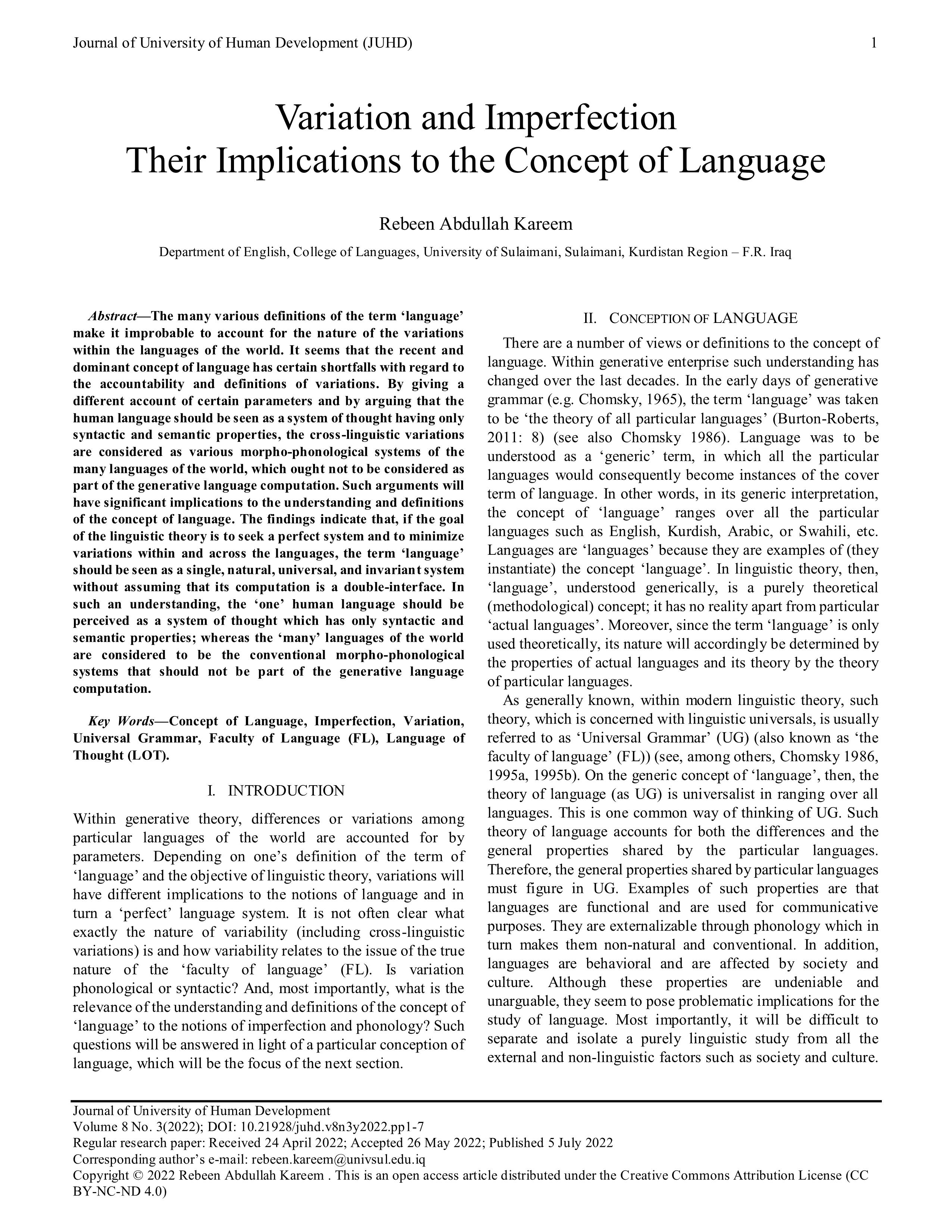Variation and Imperfection Their Implications to the Concept of Language
DOI:
https://doi.org/10.21928/juhd.v8n3y2022.pp1-7Keywords:
Concept of Language, Universal Grammar, Variation, Imperfection, Faculty of Language (FL), Language of Thought (LOT)Abstract
The many various definitions of the term ‘language’ make it improbable to account for the nature of the variations within the languages of the world. It seems that the recent and dominant concept of language has certain shortfalls with regard to the accountability and definitions of variations. By giving a different account of certain parameters and by arguing that the human language should be seen as a system of thought having only syntactic and semantic properties, the cross-linguistic variations are considered as various morpho-phonological systems of the many languages of the world, which ought not to be considered as part of the generative language computation. Such arguments will have significant implications to the understanding and definitions of the concept of language. The findings indicate that, if the goal of the linguistic theory is to seek a perfect system and to minimize variations within and across the languages, the term ‘language’ should be seen as a single, natural, universal, and invariant system without assuming that its computation is a double-interface. In such an understanding, the ‘one’ human language should be perceived as a system of thought which has only syntactic and semantic properties; whereas the ‘many’ languages of the world are considered to be the conventional morpho-phonological systems that should not be part of the generative language computation.
References
Anderson, S. (1981). Why phonology isn’t natural. Linguistic Inquiry 12, 493–553.
Berwick, R., and N. Chomsky. (2008). The biolinguistic program: the current state of its evolution and development. Ms. To appear in: di Sciullo, A.-M., Aguero-Bautista, C. (Eds.), Biolinguistic Investigations. MIT Press, Cambridge, MA.
Bloomfield, L. (1926). A set of postulates for the science of language. Language 2, 153-164.
Burton-Roberts, N. (2000). ‘Where and what is phonology? A representational perspective’ in Burton-Roberts, N., et al. (eds.) Phonological Knowledge. Oxford University Press: Oxford. 39-66.
Burton-Roberts, N., and P. Carr. (1999). On speech and natural language. Language Sciences 21, 371-406.
Burton-Roberts, N., Carr, P. & Docherty, D. (Eds.) (2000). Phonological Knowledge: conceptual and empirical issues. Oxford: Oxford University Press.
Burton-Roberts, N. (2011). ‘On the grounding of syntax and the role of phonology in human cognition’ in Lingua 121 (14).
Burton-Roberts, N. (2012). Language and languages: realist/naturalist ‘Language’. Grammar, language, and mind (unpublished lecture), Newcastle University.
Chomsky, N. (1965). Aspects of the theory of syntax. Cambridge, Mass.: MIT Press.
Chomsky, N. (1972). Language and mind. Enlarged ed. New York: Harcourt Brace Jovanovich.
Chomsky, N. (1975). Reflections on language. New York: Pantheon Books.
Chomsky, N. (1981). Lectures on government and binding. Foris, Dordrecht.
Chomsky, N., (1986). Knowledge of language. Praeger, New York.
Chomsky, N., (1991). Linguistics and cognitive science: problems and mysteries. In: Kasher, A. (Ed.), The Chomskyan Turn. Basil Blackwell, Oxford, pp. 26–53.
Chomsky, N. (1995a). Language and nature. Mind 104: 1-61.
Chomsky, N. (1995b). The minimalist program. Cambridge, Mass.: MIT Press.
Chomsky, N. (2000). The architecture of language. Oxford University Press, Oxford/New Delhi.
Chomsky, N. (2002). On nature and language. Cambridge: Cambridge University Press.
Chomsky, N. (2006). Approaching UG from below. Ms, MIT. Appeared (2007). In: Sauerland, U., Gartner, H-M. (Eds.), Chomsky’s Minimalism and the View from Syntax-Semantics. Mouton de Gruyter, Berlin/New York, pp. 1–29.
Fodor, J. (1975). The language of thought. Crowell, New York.
Fodor, J. (2008). LOT2. Oxford University Press, Oxford.
Hauser, M., Chomsky, N., & Fitch, W. (2002). The faculty of language: what is it, who has it and how did it evolve? Science 298 (5598), 1569–1579.
Hinzen, W. (2006). Mind design and minimal syntax. Oxford University Press, Oxford.
Hinzen, W. (2011). Language and thought. In: Boeckx, C. (Ed.), The Oxford handbook of linguistic minimalism. Oxford University Press, Oxford.
Jackendoff, R. & Pinker, S. (2005). The faculty of language: what’s special about it? Cognition 95, 201–236.
Kareem, R. (2016). The syntax of verbal inflection in Central Kurdish (PhD thesis), Newcastle University.
Öpengin, E. (2013). Clitic-affix interactions: A corpus-based study of person marking in the Mukri variety of Central Kurdish. (PhD thesis), Université Sorbonne Nouvelle and Universität Bamberg.
Sigurðsson, H. (2004). Meaningful silence, meaningless sounds. Linguistic Variation Handbook 4 (1), 235–259.
Tahir, R. (2018). The structure of DP in Central Kurdish (PhD thesis), Newcastle University.

Downloads
Published
How to Cite
Issue
Section
License
Copyright (c) 2022 Rebeen Abdullah Kareem

This work is licensed under a Creative Commons Attribution-NonCommercial-NoDerivatives 4.0 International License.


